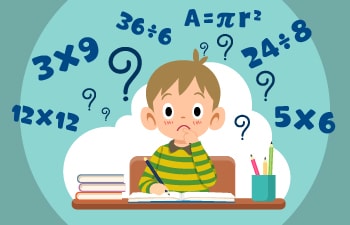Although many children and teens report that math is “hard” for them, the truth is that not all math difficulties are cognitive ones. What many people identify as difficulty with math is often an anxiety created by a faulty foundation in mathematical basics, such as fact memorization. Poor math test scores may not always be an accurate indicator of whether or not a student is “good at math.” Getting to the bottom of what is creating math anxiety for a particular child or teen can be a turning point in increasing not only test scores, but also a student’s confidence in and enjoyment of math.
How to Recognize Math Anxiety in Students
So, how does math anxiety affect students? To discover if your child may be experiencing math anxiety, watch for some of the following clues to how they talk about–or react to–math assignments.
- Being overly concerned with getting the “right answer” to a math problem vs understanding the concept behind the problem
- Stalling or creating excuses why they can’t complete an assignment or take a test
- Self-talk relating to math is often negative or defeatist (e.g. “I’m terrible at math” or “I never know the right answer.”
- Math resistance becomes strongest when there is a timed element, such as requiring him/her to complete a specific problem or problems within a given period of time
- Expressing a feeling that they will do poorly on an exam, even though they know the material
- Grades on general assignment are much better than quiz or test scores on the same material
The key to determining whether a child is dealing with apprehension about math is noticing how it impacts them emotionally. By paying close attention to their verbal and non-verbal cues, you can get a good sense of whether math resistance is because of an actual lack of comprehension of the concepts or a nervousness about math outcomes.
Common Causes of Math Anxiety
Determining how to help a child with math anxiety starts with identifying the underlying cause of the feeling. Timed tests, having wrong answers criticized, hearing negative statements about math, and a mismatch between how math is taught and how a child best learns can all trigger feelings of stress around mathematics.
One of the chief sources of distress for math students, however, comes back to a gap in their foundational math skills. A lack of math fact fluency can derail a child’s math progress indefinitely since higher math skills are usually dependent on being able to quickly recall addition, subtraction, multiplication, and division facts.
How to Reduce Math Anxiety with Game-Based Play
Students who achieve a certain level of automaticity with math facts (the ability to pull math facts from their memory without conscious effort or attention) can significantly reduce their feelings of math anxiety. Research has shown that fluency with math facts is a predictor of successful performance on standardized math tests.
Thankfully, there is a way to beat math anxiety that involves game-based play—a method kids will actually enjoy. Time4MathFacts, included with a Time4Learning monthly subscription, creates a fun, motivational, and stress-free environment for mastering addition, subtraction, multiplication, and division facts.
Students are first assessed and then provided differentiated instruction. There are numerous engaging games to choose from, and each one is tailored to a child’s unique ability level. The game-based, fast-paced approach encourages children to use the program often, leading to more and more mastery (and lower and lower math anxiety).
Time4MathFacts can be used for homeschooling, afterschool enrichment, and summer study. It is best suited for students in second through fourth grade, but can also benefit those in grades 5+ whose math anxiety can be traced to a weak math fluency foundation. Sign up for Time4Learning and gain access not only to Time4MathFacts, but also to a variety of educational materials, which will engage and challenge your child. Time4Learning can be an invaluable part of your toolbox for dealing with and preventing math anxiety.
Learn tricks and strategies to help support students struggling in math!











this was very helpful for me
Thank you for your feedback, Kayleigh! Please let us know if you have any questions or would like additional information!